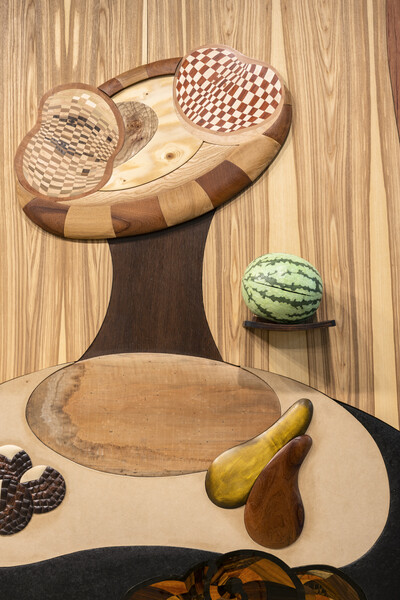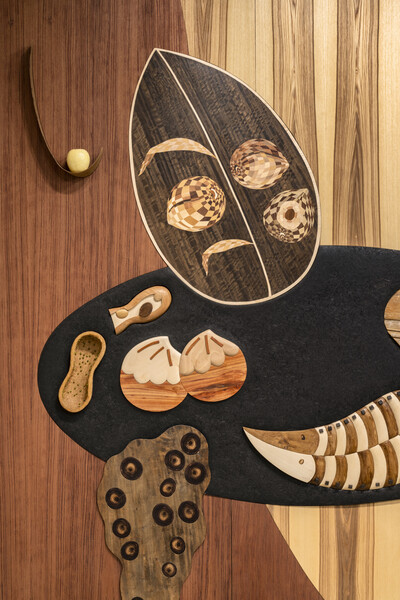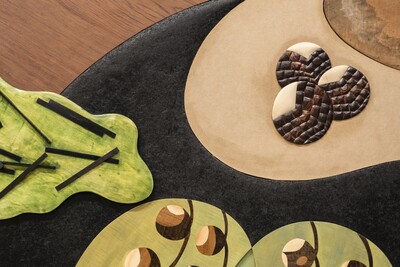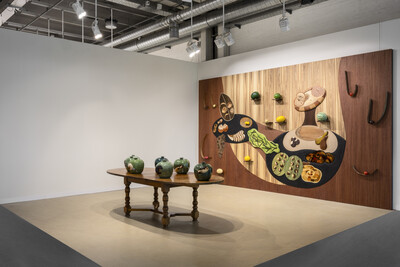Fair: Art Basel 2025, Basel
Art Basel, Basel
Statements, Booth M18
with Wei Libo
Arriving from the city of Lanzhou in China to Nantes, where he trained in various techniques, Wei experienced a form of uprooting that was as much historical as geographical. The speed of socio-economic change in contemporary China has disrupted both landscapes and memory. The story is a familiar one: industrialisation, the desertification of rural areas, and forced urbanisation. But as often happens, these collective phenomena collide with intimate family histories — like when Wei’s grandfather’s house, along with thousands of others, was demolished. That house, built and furnished by hand, stood at the centre of an artisanal way of life where everyone worked with wood and cultivated their own garden. Its destruction marked a rupture, and a deep awareness of the value of a knowledge-based, manual culture.
Wei Libo’s presentation in the Statements section of Art Basel is composed of two distinct parts. The first is an immense bas-relief in wood marquetry, covering the entire back wall of the booth.
The marquetry panel depicts a bowl of fruit, where styles mix and morph: some fruits are rendered with striking realism — detailed veins, textured skins, sharp highlights — while others drift toward symbolism, suggesting tangled crustaceans, ambiguous silhouettes, or fantastical eyes. The artist juxtaposes precious woods (oak, mahogany, cherry) with industrial and construction-grade materials, generating a vibrant contrast and a delicate tension at the heart of his approach.
In the spirit of Flemish still life painting, the artist adopts a humble and devoted posture toward his subject. This ambitious, slow production stands in quiet resistance to the fast pace of contemporary artistic creation. The work also holds a melancholic charge, echoing the tradition of memento mori still lifes and their meditations on impermanence.
Fruits are omnipresent in Wei Libo’s practice. They resonate with his connection to the land, to nourishment, and to the rural environment of his upbringing — an environment now deeply altered by rampant urbanisation. Each fruit carries both vitality and cultural memory: in many regions of China, local fruit varieties are a source of collective pride and identity. In Wei’s native region, a once-rich diversity of fruits has been lost to monocultures that favour productivity over ecology. This disappearance becomes a poignant symbol of cultural and environmental erosion.
The second part of the presentation takes the form of a large oval table — an emblem of hospitality and shared experience — on which rests a series of seven ceramic pieces, inlaid with wooden marquetry. These forms are inspired by melon-shaped ceramics widely produced during the Song Dynasty (10th–12th century), among the first objects to be mass-manufactured in Chinese history. Wei reinvents these traditional forms by inserting fragments of pop culture: the inlaid motifs resemble stylised eyes, echoing the aesthetic of the manga and cartoons he watched as a child. The ceramics appear inhabited by mischievous little sprites, evoking the characters that populated the collective imaginary of those who grew up with television in the late 1980s and early 1990s.
Across both bodies of work, Wei Libo does more than combine ancestral craft, pop references, and autobiography. He offers a metaphor for the socio-economic upheavals experienced by his generation of young rural Chinese in the 1990s. By merging tradition with reinvention, memory with critique, his work offers a subtle but incisive reflection on the transformations that have redefined cultural identity and belonging under the weight of modernisation.
Our presentation is produced with the support of CNAP - Centre national des arts plastiques.
—
Wei Libo (born in 1994 in Lanzhou, China) lives and works in Paris. He graduated from the École nationale supérieure des Beaux-Arts de Paris in 2024, where he studied in the studios of Petrit Halilaj, Alvaro Urbano, and Tatiana Trouvé.
His recent solo exhibitions include ‘Homemade’ at Sans titre, Paris (2025); ‘Furniture & I’ at FRAC Île-de-France, Paris (2025) and ‘La lune était pleine hier’ at the École nationale supérieure des Beaux-Arts de Paris. Over the summer 2025, Libo will have a solo presentation in the front window of Jousse Entreprise, Paris.
Wei Libo has also participated in numerous group exhibitions, including ‘L’art et la vie et inversement’ at Beaux-Arts de Paris (2025); ‘Gathering’, organized by Sans titre and Linseed Projects at Listenin HQ, Shanghai (2024); ‘Autohistorias’ and ‘CRUSH’ at the Palais des Beaux-Arts de Paris (2024); ‘Parasite’ at Zeto Art, Paris (2024); ‘Last Course’ (with Yahagi Ryota) at Asta-Ausstellungsraum, Düsseldorf (2023); ‘Boxenstopp’ at Es365, Düsseldorf (2022); and ‘Hemerocallis’ at Galerie RDV, Nantes (2020). His work was also showcased alongside Caroline Mesquita’s at Art-O-Rama, Marseille, in a collaboration between Union Pacific (London) and Sans titre (Paris) in 2024.
Later this year, the artist will participate in group exhibitions at Jewish Museum of Belgium, Brussels; Galerie du 19M, Paris and at LINSEED, Shanghai.
In 2024, Wei Libo was awarded the Prix des Amis des Beaux-Arts de Paris (Prix Khalil de Chazournes) and participated in the artist residency program at Villa Belleville, Paris.
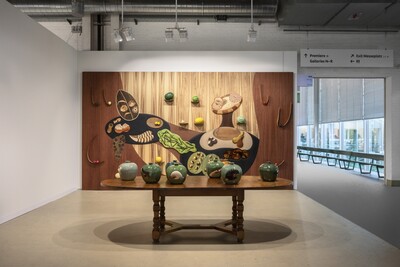
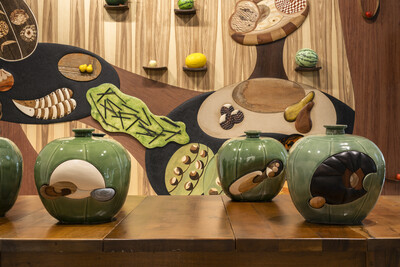
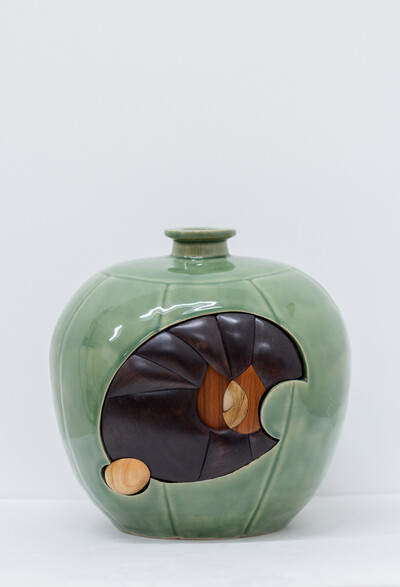
Wei Libo, Family birds (Melonia #1), 2025, ceramic, wooden marquetry, 27 × 28 × 28 cm, unique
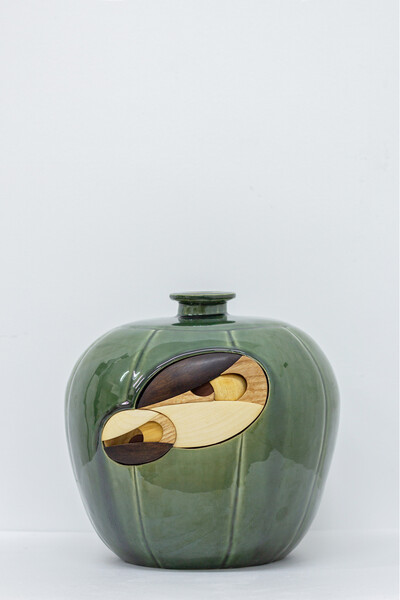
Wei Libo, Family birds (Melonia #3), 2025, ceramic, wooden marquetry, 27 × 28 × 28 cm, unique
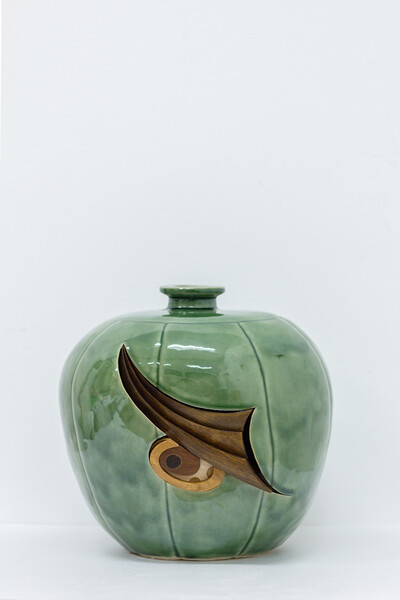
Wei Libo, Family birds (Melonia #4), 2025, ceramic, wooden marquetry, 27 × 28 × 28 cm, unique
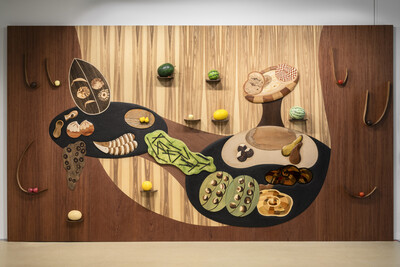
Wei Libo, Exercise with fruits, 2025, wooden marquetry, wood and acrylic paint, 320 × 540 × 15 cm (approx.), unique
